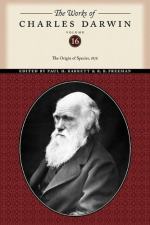These alone are the unimportant differences, which Gartner is able to point out, between hybrid and mongrel plants. On the other hand, the resemblance in mongrels and in hybrids to their respective parents, more especially in hybrids produced from nearly related species, follows according to Gartner the same laws. When two species are crossed, one has sometimes a prepotent power of impressing its likeness on the hybrid; and so I believe it to be with varieties of plants. With animals one variety certainly often has this prepotent power over another variety. Hybrid plants produced from a reciprocal cross, generally resemble each other closely; and so it is with mongrels from a reciprocal cross. Both hybrids and mongrels can be reduced to either pure parent-form, by repeated crosses in successive generations with either parent.
These several remarks are apparently applicable to animals; but the subject is here excessively complicated, partly owing to the existence of secondary sexual characters; but more especially owing to prepotency in transmitting likeness running more strongly in one sex than in the other, both when one species is crossed with another, and when one variety is crossed with another variety. For instance, I think those authors are right, who maintain that the ass has a prepotent power over the horse, so that both the mule and the hinny more resemble the ass than the horse; but that the prepotency runs more strongly in the male-ass than in the female, so that the mule, which is the offspring of the male-ass and mare, is more like an ass, than is the hinny, which is the offspring of the female-ass and stallion.
Much stress has been laid by some authors on the supposed fact, that mongrel animals alone are born closely like one of their parents; but it can be shown that this does sometimes occur with hybrids; yet I grant much less frequently with hybrids than with mongrels. Looking to the cases which I have collected of cross-bred animals closely resembling one parent, the resemblances seem chiefly confined to characters almost monstrous in their nature, and which have suddenly appeared—such as albinism, melanism, deficiency of tail or horns, or additional fingers and toes; and do not relate to characters which have been slowly acquired by selection. Consequently, sudden reversions to the perfect character of either parent would be more likely to occur with mongrels, which are descended from varieties often suddenly produced and semi-monstrous in character, than with hybrids, which are descended from species slowly and naturally produced. On the whole I entirely agree with Dr. Prosper Lucas, who, after arranging an enormous body of facts with respect to animals, comes to the conclusion, that the laws of resemblance of the child to its parents are the same, whether the two parents differ much or little from each other, namely in the union of individuals of the same variety, or of different varieties, or of distinct species.




